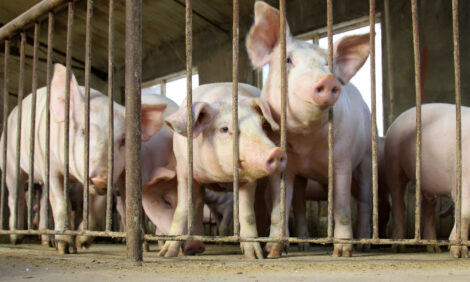



Effects of Feeding High-protein or Conventional Canola Meal on Growth, Carcass Characteristics and Cutability of Pigs
Based on their results for pig performance and carcass quality, researchers at the University of Illinois-Urbana concluded that conventional or high-protein canola meal could fully replace soybean meal as protein supplements in grower and finisher diets.The growth performance, visceral mass differences, carcass characteristics, fresh meat quality and carcass cutability of growing-finishing pigs fed diets containing high-protein canola meal (CM-HP) or conventional canola meal (CM-CV) have been investigated by D. Boler and colleagues at the University of Illinois, Urbana.
In their paper in Journal of Animal Science, they explain that seven dietary treatments were fed to investigate effects of increasing inclusion rates of CM-HP or CM-CV in a corn–soybean meal diet containing no canola meal (control). Inclusion rates were 33, 66, or 100 per cent replacement of soybean meal with either CM-HP or CM-CV.
Pigs (140 barrows and 140 gilts; two barrows and two gilts per pen) were fed experimental diets in three phases with each phase lasting 35, 28 and 28 days, respectively.
Within each phase, diets were formulated to be similar in concentrations of standardised ileal digestible indispensable amino acids and in standardized total tract digestible phosphorus but net energy concentrations were not equalised among diets.
At the conclusion of the experiment, one pig per pen was harvested.
Over the 91-day growing-finishing period, no effects of CM-HP on average daily gain, average daily feed intake or gain:feed ratio were observed but final bodyweight tended (P=0.06) to be reduced as increasing levels of CM-HP were included in the diets.
There was a linear increase (P<0.05) in average daily feed intake and a linear reduction (P<0.05) in gain:feed ratio as CM-CV inclusion level increased.
Pigs fed CM-CV also had greater (P<0.05) average daily gain and average daily feed intake than pigs fed diets containing CM-HP.
There was a linear increase (P<0.01) in liver weights, as a percentage of live weight, as CM-CV inclusion increased but that was not the case if CM-HP was included in the diets.
There was also a linear increase (P<0.05) in kidney weights, as a percentage of live weight, as CM-HP or CM-CV inclusion increased.
There were no differences among treatments for ending live weight, hot carcass weight, carcass yield, loin eye area, 10th rib backfat thickness or estimated carcass lean.
Shear force, cook loss, LM moisture, LM extractible lipid and drip loss were also not different among treatment groups.
There were no differences among treatments for any subjective LM quality evaluations (colour, marbling or firmness).
Pigs fed CM-HP had increased (P<0.05) boneless lean cutting yields and boneless carcass cutting yields than those fed CM-CV.
CM-HP and CM-CV may fully replace soybean meal as protein supplements in growing-finishing pig diets without substantially impairing pig performance or carcass quality, concluded Boler and co-authors.
Reference
Little K.L., B.M. Bohrer, T. Maison, Y. Liu, H.H. Stein and D.D. Boler. 2015. Effects of feeding canola meal from high-protein or conventional varieties of canola seeds on growth performance, carcass characteristics, and cutability of pigs. Journal of Animal Science. 93:1284-1297.
April 2015






